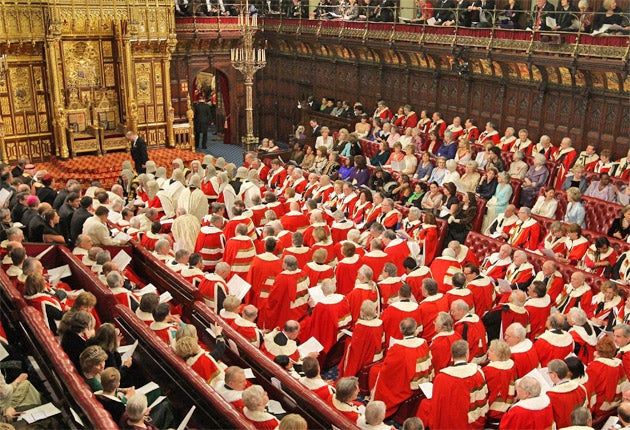Blueprint for a new politics, or much ado about not very much?
Nick Clegg's 'great reform' speech made some bold promises. Andy McSmith analyses what they will mean in reality

1. 'There will be no ID card scheme: no national identity register, a halt to second-generation biometric passports'
This should not be a problem as both parties committed themselves to it before the election. Scrapping the biometric passports was Liberal Democrat policy only, but the UK is not obliged by any international agreement to add other data to passports, and not doing so will save money, so the Tories will not mind.
2. 'We won't hold your internet and email records when there is just no reason to do so'
Goodbye to the database that was going to hold every email address, phone number and internet site anyone has visited. And it saves money.
3. 'CCTV will be properly regulated'
Since most CCTV is run by private operators, it will be interesting to see what this means in reality.
4. 'The DNA database will be properly regulated'
Your DNA could still go on the database even if you have done nothing wrong, but after a limited time it will be wiped off.
5. 'There will be no ContactPoint children's database'
This is a directory that is supposed to make sure that no child is left unprotected. The Tories had already said they would scrap it.
6. 'Schools will not take children's fingerprints without even asking their parents' consent'
It emerged in 2002 that some schools take children's thumbprints without telling parents. The Labour government warned schools to observe the Data Protection Act, but otherwise said it was a matter for local education authorities to set policy. Banning the practice will require legislation
7. 'We'll remove limits on rights to peaceful protest'
In 2005, Labour passed a law banning unauthorised demonstrations within 1km of Parliament. The Liberal Democrats promised to repeal it, which ought to be simple enough if the Tories are on side.
8. 'We'll review libel laws'
All of the parties agree that the libel laws need to be changed, although there are differences of opinion about how, so there may be a delay.
9. 'We will ask you which laws you think should go'
They will set up a website, and if enough people log in to complain about a particular law, they may or may not pay attention.
10. 'We will introduce a mechanism to block pointless new criminal offences'
But we do not know what that mechanism might be. Neither do they.
11. 'This Government will replace the House of Lords with an elected second chamber'
This is easy to promise but a nightmare to deliver because, if the Lords do not like what is proposed, they can hold it up for months or years. It is promised that a committee will report by December, but cynics doubt whether much else will happen in this parliamentary term.
12. 'We [will] legislate to fix parliamentary terms... unless Parliament votes [by 55 per cent] to dissolve itself first'
Fixing the date of the next general election should be simple. But the proposed 55 per cent hurdle has already met opposition and may not get through.
13. 'Parliament's power will be strengthened... starting with provisions to give MPs much more control over Commons business'
A committee chaired by the Labour MP Tony Wright has proposed creating a powerful new committee to control how Commons business is conducted, and removing the power of party whips to decide who sits on select committees. This was approved by the old Commons against opposition from the leaders of both Labour and the Conservatives. The Tories have seemingly dropped their opposition.
14. 'If your MP is corrupt, you can sack them'
This sounds good, but it will apply only where an MP is "guilty of serious wrongdoing" and will require the signatures of 10 per cent of people living in the constituency. It will not happen often.
15. 'We will regulate lobbying in Parliament'
There will be a statutory register of lobbyists, but other regulation may be hard to enforce.
16. 'This Government will be putting to you, in a referendum, the choice to introduce a new voting system'
There will be a referendum all right, but it may not produce a vote for reform, because most Conservative MPs, a substantial number of Labour MPs and most of the newspapers will campaign for a No vote.
17. 'We will be setting out plans to strip away unelected, inefficient quangos'
There is no reason to doubt that plans will be set out. Identifying "inefficient" quangos, and abolishing them without causing unforeseen damage, will be harder, but it will have to happen because the Conservatives are desperate to reduce public spending.
18. 'We are serious about giving councils much more power over the money they use'
This conflicts with the Government's first priority, which is to get public spending down. Both the Conservatives and Liberal Democrats have talked about taking power from Westminster and returning it to a local level.
19. 'Our plans to disperse power also include strengthening devolution to other parts of Britain'
The Conservatives had already agreed that the Scottish Parliament should have more tax-raising powers, but their manifesto promised only that they would "not stand in the way of the referendum" on more power for the Welsh Assembly. Nick Clegg's words were more positive.
20. 'And, of course, [we'll be] asking what we can do about the difficult issues surrounding the West Lothian question'
This issue has dogged politicians for nearly 25 years and has baffled Britain's finest constitutional brains, so if Nick Clegg thinks he can resolve it, he is to politics what Stephen Hawking is to physics.
Join our commenting forum
Join thought-provoking conversations, follow other Independent readers and see their replies
Comments
Bookmark popover
Removed from bookmarks